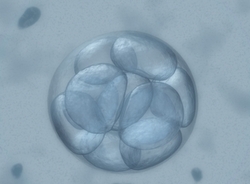
Young women who have cancer treatment often lose their fertility because chemotherapy and radiation can damage or kill their immature ovarian eggs, called oocytes. Now, Northwestern Medicine® scientists have found the molecular pathway that can prevent the death of immature ovarian eggs due to chemotherapy, potentially preserving fertility and endocrine function.
Scientists achieved this in female mice by adding a currently approved chemotherapy drug, imatinib mesylate, to another chemotherapy drug cisplatin.
The results were presented on Monday, June 17, at The Endocrine Society’s 95th Annual Meeting in San Francisco.
“This research advances the efforts to find a medical treatment to protect the fertility and hormone health of girls and young women during cancer treatment,” said So-Youn Kim, the lead investigator and a postdoctoral fellow in the laboratory of Teresa Woodruff, PhD, chief of fertility preservation at Northwestern University Feinberg School of Medicine and a member of the Robert H. Lurie Comprehensive Cancer Center of Northwestern University.
Adding imatinib mesylate to the drug cisplatin blocks the action of a protein that triggers a cascade of events resulting in death of the immature eggs. Kim discovered the protein that triggers the oocyte’s ultimate death is Tap63.
Previous research suggested that imatinib is a fertility-protecting drug against cisplatin, but reports of the drug’s effectiveness have been contradictory, Kim said. Her research confirms its effectiveness in an animal model.
She is currently testing imatinib with other chemotherapy agents to see if it also protects fertility in combination with them.
To demonstrate that imatinib protects oocytes against cisplatin, Kim and colleagues cultured ovaries (containing the immature eggs) from five-day-old mice with imatinib and cisplatin for 96 hours. The ovaries were then placed in a kidney capsule in the host mice to keep the ovaries alive. Two weeks later, the immature eggs were still alive. The imatinib did not block cisplatin-induced DNA damage, but Kim believes the eggs may recover and repair the damage over time.
“Previous reports have shown that chemotherapy and radiation-treated oocytes are able to recover from DNA damage,” Kim said.
The research was funded by the National Institutes of Health’s Eunice Kennedy Shriver National Institute of Child Health and Human Development of the National Institutes of Health, grant U54 HD076188.






